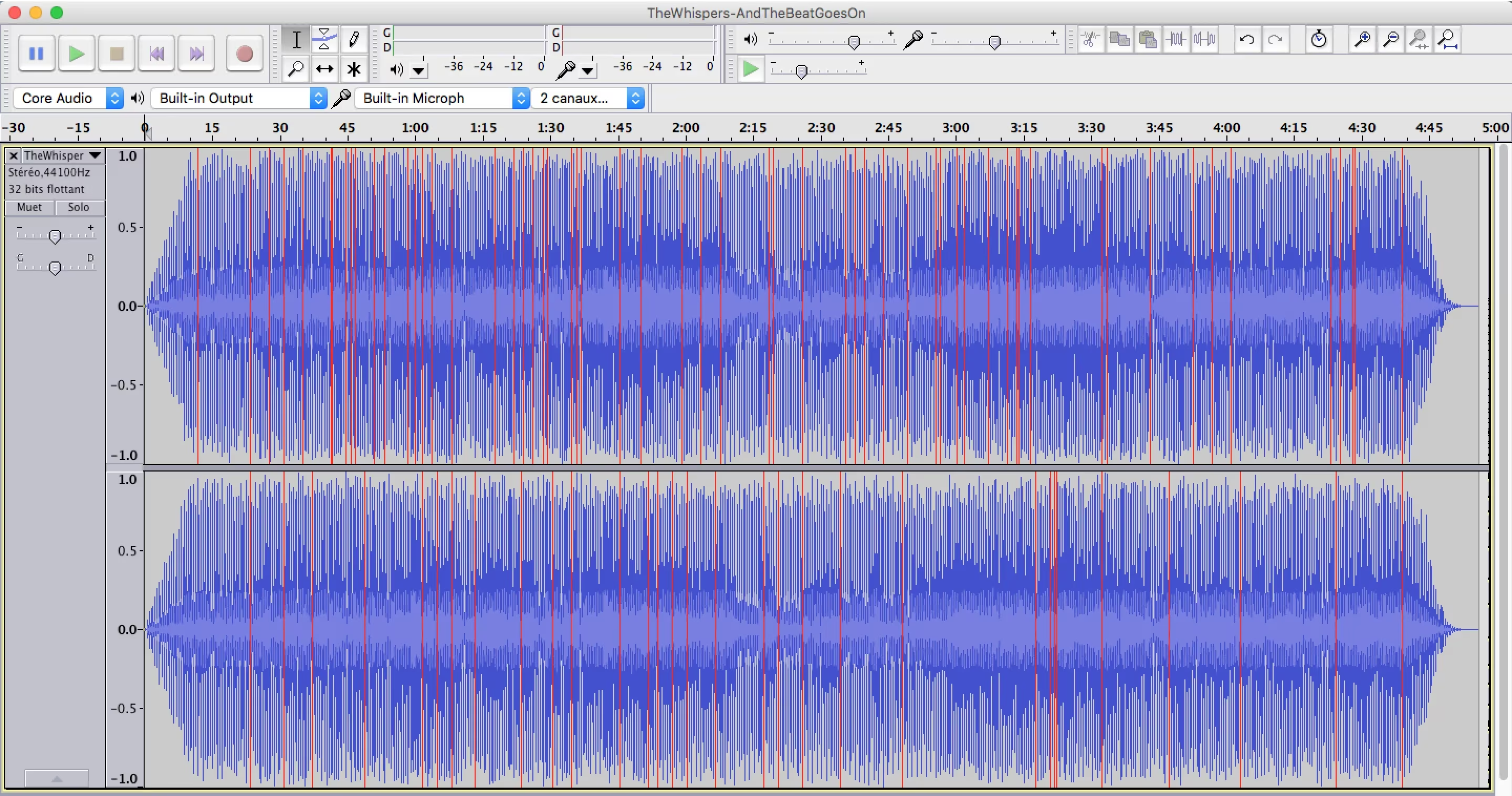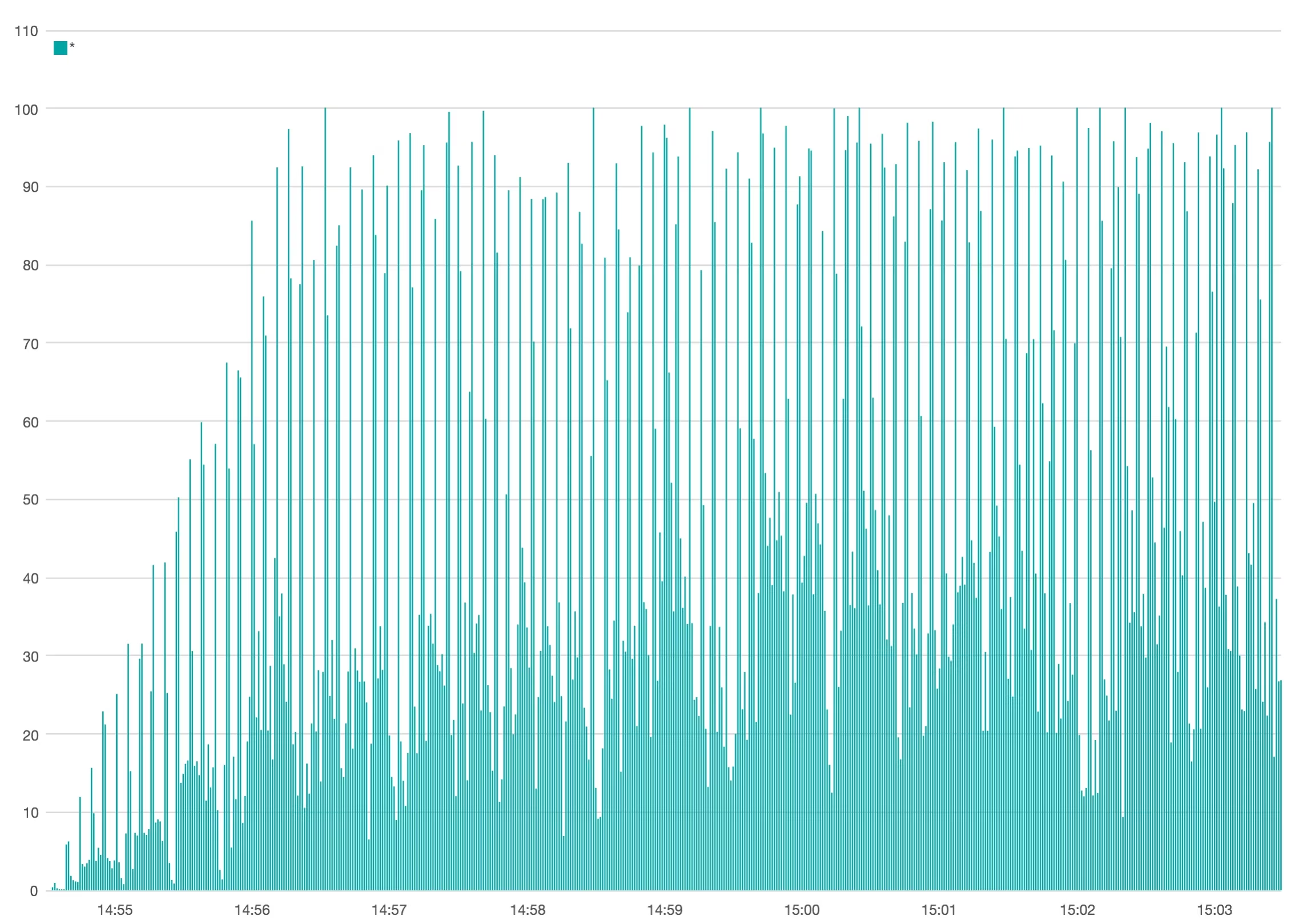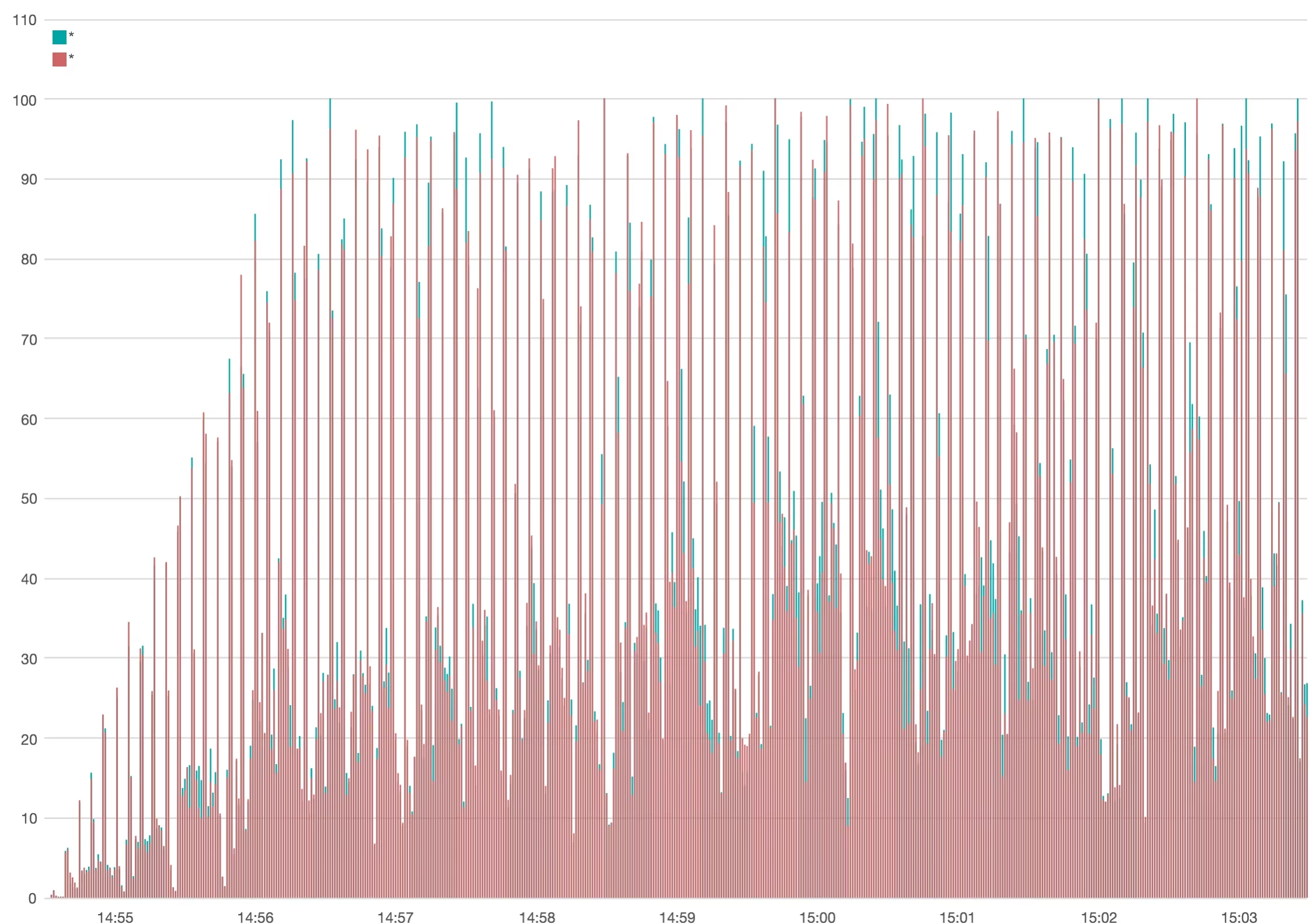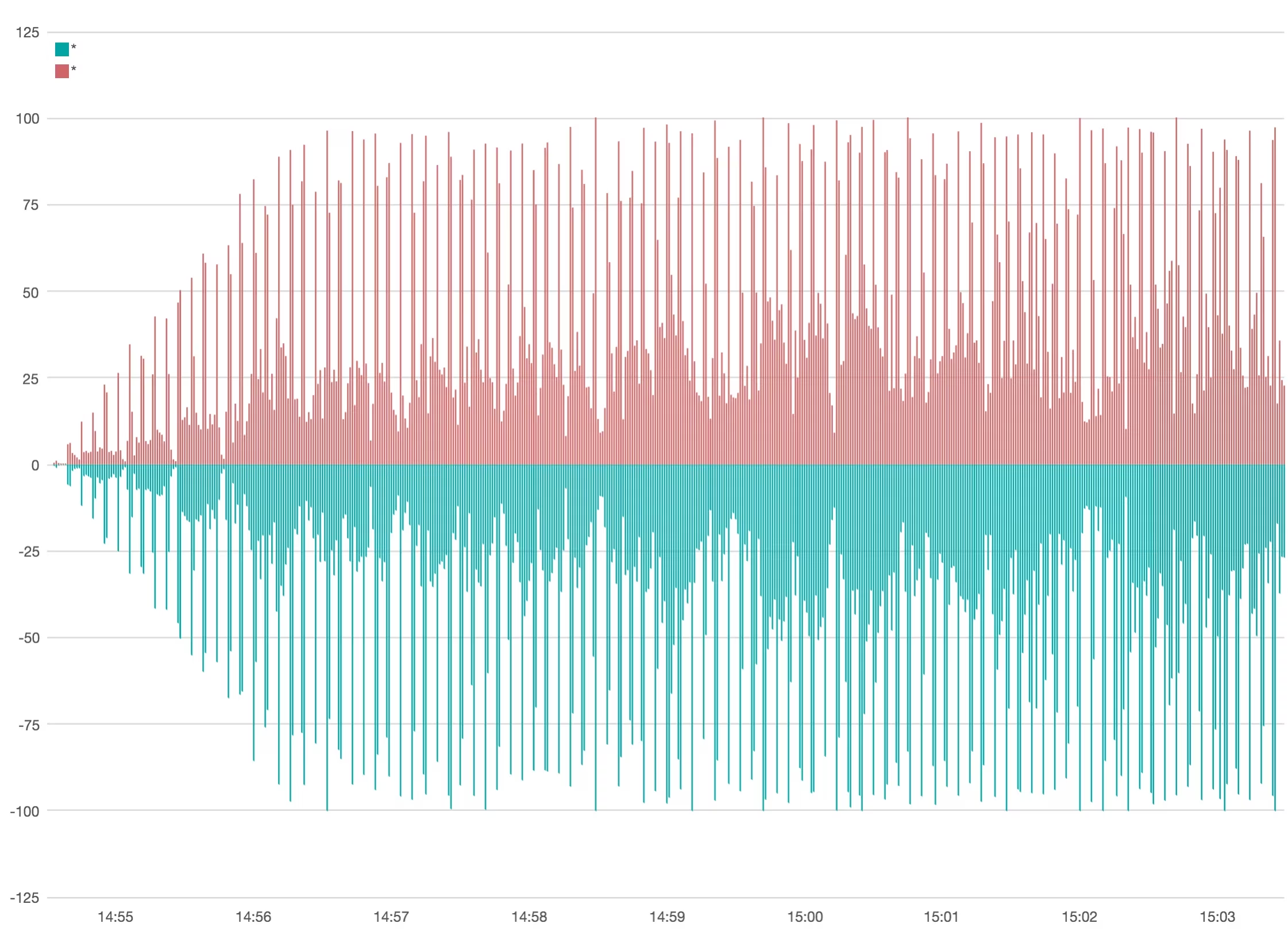
Sounds like a cool music, right? At least this is one of my favorite tracks.
May be some of you already know that, I enjoy doing some DeeJaying for my friends.
But today, I want to speak about another kind of beats. Elastic beats!

Elastic Beats
Actually my favorite funky music track is a one from Georges Duke: Reach out! But this is another story…
Beats
So what are beats?
Beats are lightweight shippers that collect and ship all kinds of operational data to Elasticsearch
Important terms here:
lightweight: indeed, written in Golang, using few resourcesall kinds of operational data: yeah! You are just limited by your imagination 😊. It can come from a network card from where you can sniff a known protocol such as MySQL, PostgreSQL, MongoDB, ICMP, HTTP… It can come from a file you can basicallytail -fto elasticsearch. It can come from various metrics from your system, like running a TOP command on every single machine you have and correlate information from them…
So very flexible…
I came with this idea… I like music. I like beats. Let’s try to create another beat: soundbeat!
Prerequisites
You need to have:
go:brew install goglide:brew install glide
Soundbeat
The goal is more to learn how to write a beat than the feature itself.
The soundbeat will read a MP3 file, then extract the sound level for left and right channels using a given period for each sample.
The final goal is to generate a waveform like this:

And the beat goes on
Generate a beat from a template
We will use the great Beat generator project which basically creates a skeleton for your beat.
cookiecutter https://github.com/elastic/beat-generator.git
The generator is asking some questions:
project_name [Examplebeat]: soundbeat
github_name [your-github-name]: dadoonet
beat [soundbeat]:
beat_path [github.com/dadoonet]:
full_name [Firstname Lastname]: David Pilato
Just cd in the generated dir:
cd $GOPATH/src/github.com/dadoonet/soundbeat
You have a full beat project:
$ tree
.
├── CONTRIBUTING.md
├── LICENSE
├── Makefile
├── README.md
├── beater
│ └── soundbeat.go
├── config
│ └── config.go
├── dev-tools
│ └── packer
│ ├── Makefile
│ ├── beats
│ │ └── soundbeat.yml
│ └── version.yml
├── docs
│ └── index.asciidoc
├── etc
│ ├── beat.yml
│ ├── fields.yml
│ └── soundbeat.template.json
├── glide.yaml
├── main.go
├── main_test.go
└── tests
└── system
├── config
│ └── soundbeat.yml.j2
├── requirements.txt
├── soundbeat.py
└── test_base.py
This project depends on libbeat which provides already all the needed stuff to read configuration file or write data to stdout or elasticsearch.
Just run now:
make
It will install the needed dependencies and create your git repository and git add all your files.
If you run make again, it will compile and build your binary soundbeat.
libsox sound library
The SoX library provides all the tool we need for our use case. You have different ways for installing the library. On my mac, I used:
brew install sox
Kristoffer Grönlund created a golang binding for SoX . Let’s use it.
In glide.yaml, we add this dependency:
- package: github.com/krig/go-sox
Then pull the library from internet with:
make update-deps
We now have the library. We can start coding our beat.
Writing the logic
All the code will basically go into beater/soundbeat.go.
Import libs
We have to import all the needed libs:
import (
"fmt"
"time"
"errors"
"math"
"github.com/krig/go-sox"
"github.com/elastic/beats/libbeat/beat"
"github.com/elastic/beats/libbeat/cfgfile"
"github.com/elastic/beats/libbeat/common"
"github.com/elastic/beats/libbeat/logp"
"github.com/dadoonet/soundbeat/config"
)
Soundbeat settings
We will define 3 settings:
name: MP3 filenameperiod: size of one sound sample (like100ms)zoom: it’s basically a hack for a better rendering in Kibana as it does not support aggregations under 1 second .
type Soundbeat struct {
beatConfig *config.Config
done chan struct{}
name string
period time.Duration
zoom float64
}
Settings are read from soundbeat.yml file by default. This file is automatically generated from the default libbeat configuration file and the content of etc/beat.yml.
We can change this file and provide a default example:
################### Soundbeat Configuration Example #########################
############################# Soundbeat ######################################
soundbeat:
# MP3 file to analyze
name: musics/TheWhispers-AndTheBeatGoesOn.mp3
# Defines the size of each sample
period: 100ms
# Zoom factor for a better Kibana rendering (default to 1.0)
zoom: 10.0
The config/config.go file managed this configuration file:
// Config is put into a different package to prevent cyclic imports in case
// it is needed in several locations
package config
type Config struct {
Soundbeat SoundbeatConfig
}
type SoundbeatConfig struct {
Name string `yaml:"name"`
Period string `yaml:"period"`
Zoom float64 `yaml:"zoom"`
}
We need to change the code in Setup method:
func (bt *Soundbeat) Setup(b *beat.Beat) error {
// All libSoX applications must start by initializing the SoX library
if !sox.Init() {
return errors.New("Failed to initialize SoX")
}
// Make sure to call Quit before terminating
defer sox.Quit()
period, err := configDuration(bt.beatConfig.Soundbeat.Period, 10 * time.Millisecond)
if err != nil {
return err
}
name := bt.beatConfig.Soundbeat.Name
if name == "" {
return errors.New("no name set")
}
zoom := 1.0
if bt.beatConfig.Soundbeat.Zoom != 0.0 {
zoom = bt.beatConfig.Soundbeat.Zoom
}
bt.name = name
bt.period = period
bt.zoom = zoom
return nil
}
func configDuration(cfg string, d time.Duration) (time.Duration, error) {
if cfg != "" {
return time.ParseDuration(cfg)
} else {
return d, nil
}
}
In this method, we make sure that libSoX is working well. We also define all default values and check that a name has been set.
The Run method
The Run method is where we need to implement the logic. It will read the file, extract the samples and for each sample will generate an event which should be sent to elasticsearch.
This opens the file for reading:
in := sox.OpenRead(bt.name)
if in == nil {
logp.Err("Failed to open input file")
}
// Close the file before exiting
defer in.Release()
The total duration is the number of samples given by Length() divided by 2 (as we expect a stereo file) divided by the rate give by Rate().
For example, for the MP3 file of The Whispers, we have 26 123 340 samples, the file is a stereo file (2 tracks) and the bitrate is 44 100 Hz.
So the duration of the track is: 26123340/2/44100 which is 296.182s
duration := float64(in.Signal().Length()) / float64(in.Signal().Channels()) / in.Signal().Rate()
We will use the @timestamp defacto standard for the timestamp field in Logstash/Beats/Kibana applications.
So we will start from now() and add a new sample every period.
We also apply the zoom factor to the time scale.
modifed_period := float64(period.Nanoseconds()) * bt.zoom
now = now.Add(time.Duration(modifed_period))
For each sample, we get the level of the sound for left and right channels and we store them in left and right fields.
Then we generate an event which contains this information and we publish it:
event := common.MapStr{
"@timestamp": common.Time(now),
"type": b.Name,
"left": left * 100.0,
"right": right * 100.0,
}
b.Events.PublishEvent(event)
This is how the full Run method looks like:
func (bt *Soundbeat) Run(b *beat.Beat) error {
logp.Info("soundbeat is starting...")
// Open the input file (with default parameters)
in := sox.OpenRead(bt.name)
if in == nil {
logp.Err("Failed to open input file")
}
// Close the file before exiting
defer in.Release()
// This example program requires that the audio has precisely 2 channels:
if in.Signal().Channels() != 2 {
logp.Err("Input must be 2 channels")
}
duration := float64(in.Signal().Length()) / float64(in.Signal().Channels()) / in.Signal().Rate()
now := time.Now()
period := bt.period
// Convert block size (in seconds) to a number of samples:
block_size := int64(period.Seconds() * float64(in.Signal().Rate()) * float64(in.Signal().Channels()) + 0.5)
// Make sure that this is at a `wide sample' boundary:
block_size -= block_size % int64(in.Signal().Channels())
// Allocate a block of memory to store the block of audio samples:
buf := make([]sox.Sample, block_size)
// Read and process blocks of audio for the selected duration or until EOF:
for blocks := 0; in.Read(buf, uint(block_size)) == block_size && float64(blocks) * period.Seconds() < duration; blocks++ {
left := 0.0
right := 0.0
// We increment time with a block_size (in seconds)
// But we first zoom accordingly to the zoom factor we set
modifed_period := float64(period.Nanoseconds()) * bt.zoom
now = now.Add(time.Duration(modifed_period))
for i := int64(0); i < block_size; i++ {
// convert the sample from SoX's internal format to a `float64' for
// processing in this application:
sample := sox.SampleToFloat64(buf[i])
// The samples for each channel are interleaved; in this example
// we allow only stereo audio, so the left channel audio can be found in
// even-numbered samples, and the right channel audio in odd-numbered
// samples:
if (i & 1) != 0 {
right = math.Max(right, math.Abs(sample))
} else {
left = math.Max(left, math.Abs(sample))
}
}
event := common.MapStr{
"@timestamp": common.Time(now),
"type": b.Name,
"left": left * 100.0,
"right": right * 100.0,
}
b.Events.PublishEvent(event)
}
logp.Info("soundbeat ended analyzing file %s", bt.name)
return nil
}
We can now build our beat:
# This will merge our changes in etc/beat.yml to ./soundbeat.yml
make update
# This will compile
make
And use it! This will start our beat in debug mode without pushing anything:
./soundbeat -N -e -d "*"
It will produce something like:
2016/03/18 12:40:18.031084 beat.go:221: DBG Initializing output plugins
2016/03/18 12:40:18.031128 publish.go:205: INFO Dry run mode. All output types except the file based one are disabled.
2016/03/18 12:40:18.031144 geolite.go:24: INFO GeoIP disabled: No paths were set under shipper.geoip.paths
2016/03/18 12:40:18.031186 publish.go:291: INFO Publisher name: MacBook-Pro-4.local
2016/03/18 12:40:18.031320 beat.go:238: INFO Init Beat: soundbeat; Version: 5.0.0-SNAPSHOT
2016/03/18 12:40:18.031670 soundbeat.go:76: INFO soundbeat has been configured:
2016/03/18 12:40:18.031681 soundbeat.go:77: INFO - Name: musics/TheWhispers-AndTheBeatGoesOn.mp3
2016/03/18 12:40:18.031687 soundbeat.go:78: INFO - Period: 100ms
2016/03/18 12:40:18.031703 soundbeat.go:79: INFO - Zoom: 10.000000
2016/03/18 12:40:18.031769 beat.go:267: INFO soundbeat sucessfully setup. Start running.
2016/03/18 12:40:18.031774 soundbeat.go:93: INFO soundbeat is starting...
2016/03/18 12:40:18.032152 soundbeat.go:116: INFO - Duration 296.182993 s
2016/03/18 12:40:18.032165 soundbeat.go:117: INFO - Channels 2
2016/03/18 12:40:18.032171 soundbeat.go:118: INFO - Rate 44100 Hz
2016/03/18 12:40:18.032721 publish.go:112: DBG Publish: {
"@timestamp": "2016-03-18T12:40:19.032Z",
"beat": {
"hostname": "MacBook-Pro-4.local",
"name": "MacBook-Pro-4.local"
},
"left": 0,
"right": 0,
"type": "soundbeat"
}
...
2016/03/18 12:38:52.469365 async.go:48: DBG publisher disabled
2016/03/18 12:38:52.469688 publish.go:112: DBG Publish: {
"@timestamp": "2016-03-18T13:28:10.947Z",
"beat": {
"hostname": "MacBook-Pro-4.local",
"name": "MacBook-Pro-4.local"
},
"left": 0,
"right": 0,
"type": "soundbeat"
}
2016/03/18 12:38:52.469695 async.go:48: DBG publisher disabled
2016/03/18 12:38:52.469768 soundbeat.go:167: INFO soundbeat ended analyzing file musics/TheWhispers-AndTheBeatGoesOn.mp3
2016/03/18 12:38:52.469911 beat.go:307: INFO Start exiting beat
2016/03/18 12:38:52.469926 beat.go:282: INFO Stopping Beat
2016/03/18 12:38:52.469937 beat.go:290: INFO Cleaning up soundbeat before shutting down.
2016/03/18 12:38:52.469945 beat.go:139: INFO Exit beat completed
Connecting to elasticsearch
We need to define a template for elasticsearch if we want to force elasticsearch using our mapping. But we are lucky! The beat-generator provides everything out of the box!
Just edit etc/fields.yml and change the soundbeat part to:
soundbeat:
type: group
fields:
- name: name
type: string
required: true
description: >
Sound file name
- name: left
type: double
required: true
description: >
Left sound level
- name: right
type: double
required: true
description: >
Right sound level
Then, run:
make update
It will generate the etc/soundbeat.template.json file. And cherry on the cake, it will also update the documentation in docs dir.
Start elasticsearch:
bin/elasticsearch
[2016-03-18 14:53:33,487][INFO ][node ] [Katu] version[2.2.1], pid[82105], build[d045fc2/2016-03-09T09:38:54Z]
[2016-03-18 14:53:33,489][INFO ][node ] [Katu] initializing ...
[2016-03-18 14:53:34,111][INFO ][plugins ] [Katu] modules [lang-expression, lang-groovy], plugins [], sites []
[2016-03-18 14:53:34,285][INFO ][env ] [Katu] using [1] data paths, mounts [[/ (/dev/disk1)]], net usable_space [3.6gb], net total_space [464.7gb], spins? [unknown], types [hfs]
[2016-03-18 14:53:34,285][INFO ][env ] [Katu] heap size [990.7mb], compressed ordinary object pointers [true]
[2016-03-18 14:53:34,286][WARN ][env ] [Katu] max file descriptors [10240] for elasticsearch process likely too low, consider increasing to at least [65536]
[2016-03-18 14:53:36,456][INFO ][node ] [Katu] initialized
[2016-03-18 14:53:36,456][INFO ][node ] [Katu] starting ...
[2016-03-18 14:53:36,572][INFO ][transport ] [Katu] publish_address {127.0.0.1:9300}, bound_addresses {[fe80::1]:9300}, {[::1]:9300}, {127.0.0.1:9300}
[2016-03-18 14:53:36,584][INFO ][discovery ] [Katu] elasticsearch/b_T6HUb-TXyUTN8Af6YdEQ
[2016-03-18 14:53:39,618][INFO ][cluster.service ] [Katu] new_master {Katu}{b_T6HUb-TXyUTN8Af6YdEQ}{127.0.0.1}{127.0.0.1:9300}, reason: zen-disco-join(elected_as_master, [0] joins received)
[2016-03-18 14:53:39,638][INFO ][http ] [Katu] publish_address {127.0.0.1:9200}, bound_addresses {[fe80::1]:9200}, {[::1]:9200}, {127.0.0.1:9200}
[2016-03-18 14:53:39,638][INFO ][node ] [Katu] started
And apply the template:
curl -XPUT 'http://localhost:9200/_template/soundbeat' -d@etc/soundbeat.template.json
And launch soundbeat again with the standard mode:
./soundbeat
In elasticsearch logs, you should see:
[2016-03-18 14:54:31,599][INFO ][cluster.metadata ] [Katu] [soundbeat-2016.03.18] creating index, cause [auto(bulk api)], templates [soundbeat], shards [5]/[1], mappings [_default_, soundbeat]
[2016-03-18 14:54:31,725][INFO ][cluster.metadata ] [Katu] [soundbeat-2016.03.18] update_mapping [soundbeat]
[2016-03-18 14:54:31,744][INFO ][cluster.routing.allocation] [Katu] Cluster health status changed from [RED] to [YELLOW] (reason: [shards started [[soundbeat-2016.03.18][4], [soundbeat-2016.03.18][4]] ...]).
Visualize in Kibana
Just launch Kibana:
bin/kibana
And open http://0.0.0.0:5601/
You have to change the time range. And look into the future!
Why this? Because we injected data from now and generated a 5 minutes long music waveform.
But remember that we used a zoom factor of 10x for a better rendering in Kibana.
So here, I’ll look at data from 2016-03-18 14:54:30 to 2016-03-18 15:03:30 for the begining of the music.

Select time range
Let’s create a Timeseries visualization!

Timeseries visualization
Then, we define interval to 1s and set the Timelion expression:
.es(index="soundbeat-*",metric="min:left").bars(1)

Left waveform
We can also add the right channel:
.es(index="soundbeat-*",metric="min:left").bars(1),.es(index="soundbeat-*",metric="min:right").bars(1)

With Right waveform
But this will overlap. So let’s fix that by negative by 1 the left channel:
.es(index="soundbeat-*",metric="min:left").multiply(-1).bars(1),.es(index="soundbeat-*",metric="min:right").bars(1)
We now have something which looks like the waveform we are looking for!

Final waveform
Resources
- Beats Platform Reference
- Beat Generator
- Beat developer guide
- soundbeat source code
